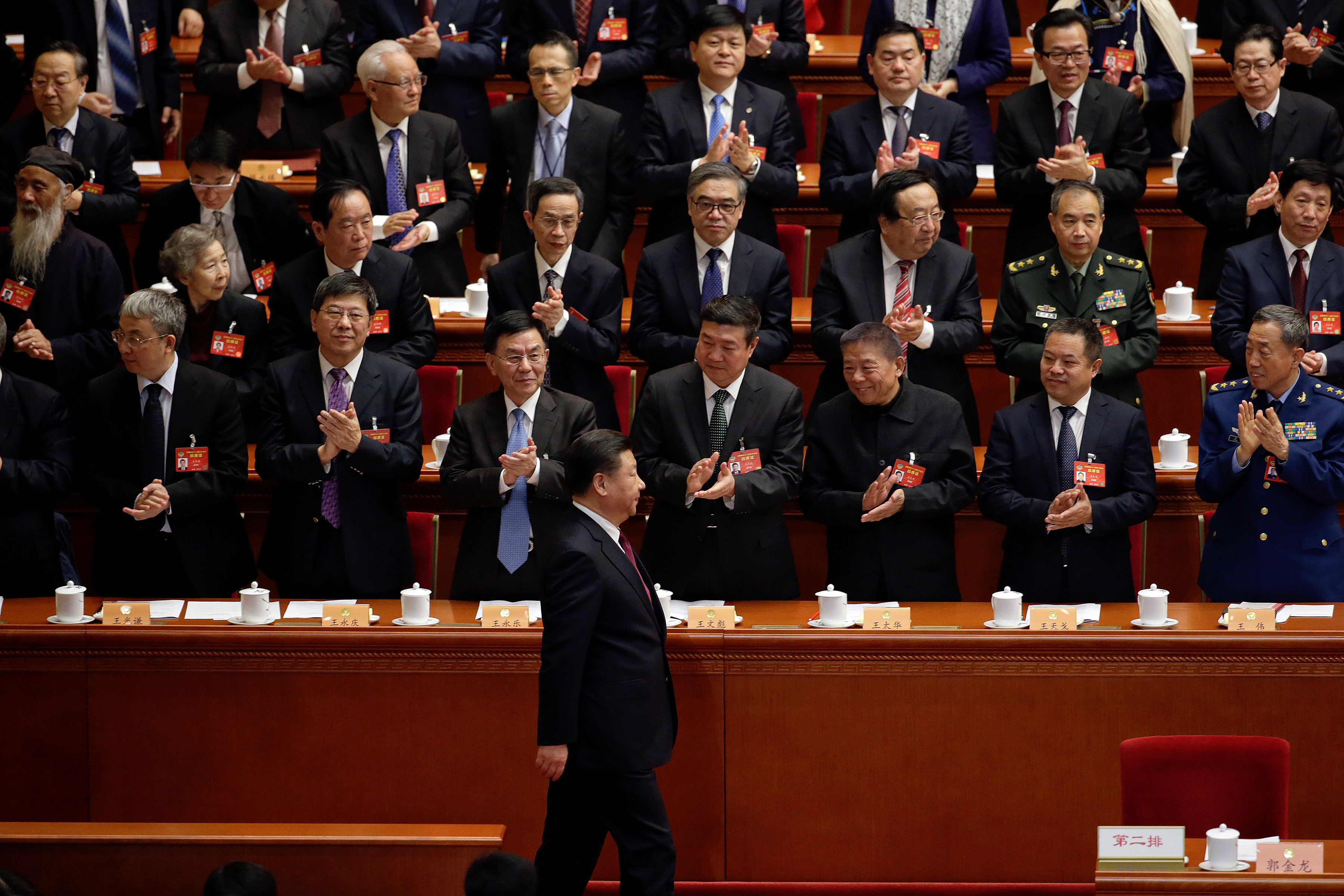
Delegates clap their hands as China’s President Xi Jinping (1st row) arrives for the opening session of the Chinese People’s Political Consultative Conference (CPPCC) at the Great Hall of the People in Beijing, March 3, 2017. (Photo courtesy of Reuters)
Domestic and Foreign Policy Impacts
According to Sourabh Gupta at The Institute for China-America Studies (ICAS), the domestic policy implications of the two-term limit abolishment decision are strong and profound. “This decision is reflective of President Xi’s other programs which are for his own personal power consolidation, such as his anti-corruption drive. Xi will be pushing ahead with a longer-term plan to fully put economic reforms in place and this decision is part of that plan.”, Gupta says.
However, the decision also continues to play into a larger narrative characterized by suspicion over China’s rise, particularly from Western countries, with respect to China’s ultimate intentions in the future. The suspicion follows previous skepticism regarding China’s “new model of great power relations” proposal and will linger regardless of who ultimately is the Chinese president.
The overall effect of Xi extending his tenure will most likely be increasing suspicion from these very same quarters. However, this is also balanced by previous statements from Xi that he’s interested in China working harmoniously within the global system as a “responsible stakeholder”, not as a revisionist power as outlined in the latest U.S. National Security Strategy.
Unfortunately, according to some Western critics, the move to eliminate the term limit has only confirmed that China as a whole is on an even more authoritarian trajectory for the future. This has occurred despite continuous U.S. economic engagement which was initially hoped to eventually have a liberalizing effect on China’s political system.
Compounding this misperception is the constant Western refrain regarding China’s economy, namely that it is “slowing down”. Unfortunately, this perspective fails to understand that this is precisely the goal of China’s leadership in that it realizes that a possibly slower-growth economy based on internal consumption is much more sustainable for the future, thereby enhancing the government (and the Communist Party’s) own legitimacy.
Jun Isomura of The Hudson Institute concurs with Gupta that economics was a primary driver behind the decision to lift presidential term limits. In today’s post-ideological era, continuous sustainable economic growth forms the basis for the Party’s continued legitimacy. Tellingly, Isomura speculates that the Party itself is concerned with a possible collapse of its legitimacy around 2030 if sustainable economic growth is not maintained, citing a previous Hudson Institute report on the subject. As an example, a primary objective of China’s Belt and Road Initiative (BRI) is to increase economic opportunities for people moving in from China’s inner provinces to its more affluent coastal cities, thereby increasing both economic and political stability for China itself.
Additionally, “President Xi is trying to survive this problem, not only through his anti-corruption campaign, but also through increasing his grip on the military. This was done through his role as Chairman of the Central Military Commission with the recent reorganization of the previous seven, more autonomous, regional military commands into only five currently. This was also meant to combat issues such as smuggling within the military.” Isomura states.
Advantages, Disadvantages, and Impact on “Two Sessions”
Because this is a critical time with respect to reform in China, the primary advantage of the presidential two-term limit abolishment is that it will enable these various reforms to be enthusiastically pursued for the longer-term. Theoretically, this can also increase basic stability within China’s political system.
Inversely, the abolishment can be a disadvantage as well. This is because from an increased political stability perspective, Xi might gradually come to be surrounded by more “yes men”. Advisors of this sort may not be prone to giving honest feedback to the president lest they be accused of inciting instability within the system. Overall, this may lead to false impressions and bad advice given to whomever the Chinese president is, and so will be detrimental to the country as a whole in the long-term.
According to Gupta, one of the biggest dangers is China’s middle-income society, currently hovering at around $10,000 per capita. “From this standpoint, China is currently where civic demands started to really grow in South Korea and Taiwan in the 1970s. Most likely, China itself has about 10 years before this same kind of demand starts to grow within China proper.”, Gupta states, mirroring Isomura’s prediction. However, President Xi and the Communist Party of China in general have no political liberalization goals, just a continuation of clamping down on corruption.
From a Party-wide perspective, factional rivalries might occur if a weaker leader assumes power post-Xi. This weakness would come into play despite the abolishment of the two-term presidential limit and might come primarily from two sources. First, the fact that the Communist Party has no plans at all for political liberalization in the face of the Chinese people’s overall rising economic fortunes might place its legitimacy in the eyes of the people into question.
Additionally, Gupta goes on to further state that, “More fundamentally, this weaker leader would be even further removed from China’s original paramount leaders of Mao and Deng than even Xi himself is, and so therefore might have less of a “Mandate from Heaven” from the people’s perspective. Compounding this scenario would be the fact that one-party systems typically do not collapse due to external factors, but due to internal rivalries and fractures. Popular perception of these fractures might, in turn, make an already weakened Party even more vulnerable from a legitimacy perspective.”
For this reason, according to Gupta, the new eradication of the two-term limit for presidents was easily codified into constitutional amendments recently at the Two Sessions. Again, the move is expected to give Xi a longer time horizon to fully transition the Chinese economy from one of production and investment, typified by the opening up period during the late 1970s and 1980s, to one of increasing consumption currently.